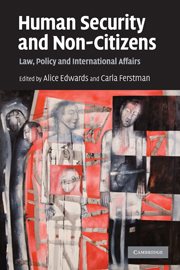Book contents
- Frontmatter
- Contents
- About the editors
- About the contributors
- Preface
- Acknowledgements
- Part I Human security, human rights and human dignity
- Part II Physical and legal security, armed conflict and refuge
- 2 The value of the human security framework in addressing statelessness
- 3 Protection and empowerment: strategies to strengthen refugees' human security
- 4 From here to where? Refugees living in protracted situations in Africa
- 5 Once we were warriors: critical reflections on refugee and IDP militarisation and human security
- 6 Human security and protection from refoulement in the maritime context
- Part III Migration, development and environment
- Part IV National security and the ‘war on terror’
- Index
2 - The value of the human security framework in addressing statelessness
Published online by Cambridge University Press: 17 February 2011
- Frontmatter
- Contents
- About the editors
- About the contributors
- Preface
- Acknowledgements
- Part I Human security, human rights and human dignity
- Part II Physical and legal security, armed conflict and refuge
- 2 The value of the human security framework in addressing statelessness
- 3 Protection and empowerment: strategies to strengthen refugees' human security
- 4 From here to where? Refugees living in protracted situations in Africa
- 5 Once we were warriors: critical reflections on refugee and IDP militarisation and human security
- 6 Human security and protection from refoulement in the maritime context
- Part III Migration, development and environment
- Part IV National security and the ‘war on terror’
- Index
Summary
Introduction
Looking at an old problem from a new angle can often be a fruitful exercise and statelessness is certainly one of those old problems that could benefit from a fresh perspective. While the problem of statelessness is currently relatively little discussed in the field of international relations, it has been a concern of the international community since the advent of the League of Nations and was one of the first issues tackled by the United Nations. Despite a number of major advances in recent years – in countries such as Sri Lanka, Ukraine and Nepal – the incidence of statelessness and the severity of the plight of some stateless populations is as much a cause for concern now as it was in the period following World War II, when the issue first featured prominently on the agenda of the international community. This chapter discusses how the international response to statelessness has developed since the advent of the United Nations, considering what contribution the tailor-made statelessness conventions of 1954 and 1961 and the development of human rights law have made in this respect. What are the strengths of these respective frameworks and what questions do they leave unanswered? Thereafter, it examines whether the emerging human security debate offers the desired ‘fresh perspective’ and thus to what extent it consolidates, expands upon or endangers previously existing arrangements for addressing statelessness.
- Type
- Chapter
- Information
- Human Security and Non-CitizensLaw, Policy and International Affairs, pp. 49 - 81Publisher: Cambridge University PressPrint publication year: 2010
- 4
- Cited by



